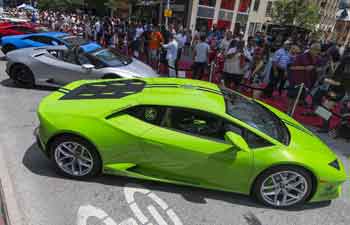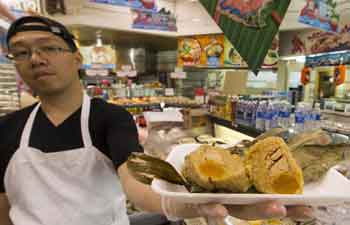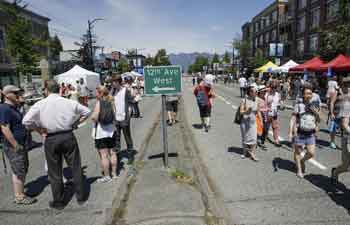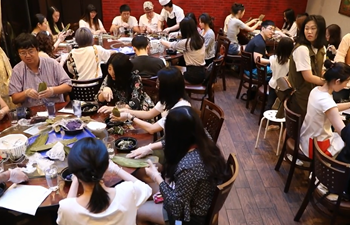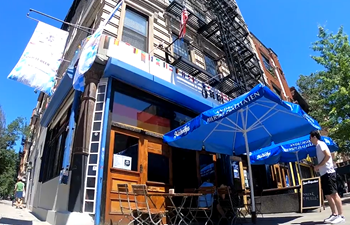by Xinhua writer Xia Lin
NEW YORK, June 16 (Xinhua) -- Sixty-three-year-old Qian Xuejuan felt being home again, when her daughter's company in New York City invited her to teach the staffers to make Zongzi, sticky rice dumplings with which Chinese people celebrate the Dragon Boat Festival, due on Monday for this year.
"I learned how to make Zongzi from my parents. Now I try to teach the method to the young generation of my daughter's age, and the most amazing thing is that it happens here in New York, thousands of kilometers away from my hometown!" said Qian, who was born and grew up in Jiaxing City, China's eastern Zhejiang Province, a part of the region where the festival, also called Duanwu, originated around 2,500 years ago.
The city is also home to one of the most famous Zongzi brands in China, Wufangzhai.
HERITAGE
A notable part of celebrating Duanwu is making and eating Zongzi with family members. People traditionally wrap Zongzi in leaves of bamboo, lotus or even banana which give a special aroma and flavor to the sticky rice and fillings.
Qian's daughter works for a Chinese company based in New York City and she has stayed here for several months to take care of her daughter and granddaughter. The company mobilized all its employees to make Zongzi by hand to mark the festival, only finding that most of them were so young and never had a chance to learn how to make the festival delicacy.
"They know I am from Jiaxing, and would count on me to show them the knack," said Qian, who has helped the company's chefs prepare ingredients on Saturday and will pass on the trick and recipe, hand by hand, to her daughter's colleagues on Sunday.
Choices of fillings vary depending on regions. Northern regions in China prefer sweet or dessert-styled Zongzi, with bean paste, dates and nuts as fillings. Southern regions in China prefer savory Zongzi, with a variety of fillings including marinated pork belly, chicken, sausage and salted duck eggs. The southern style will be the company's top choice this year.
HOT SALE
In China, Zongzi is considered as a symbol of luck, as the pronunciation of "Zong" is very similar to the pronunciation of "Zhong." This Chinese character has a positive connotation, often used in words such as "winning a prize" and "scoring high in an exam."
Earlier in May, the seasonal treat was put on sale in supermarkets and restaurants in the Flushing Chinatown, Queens. This is a prospering Chinese-American enclave with a rich variety of Chinese life styles, especially those related with food and other daily life elements.
A case in point, Wang's, a restaurant specialized in sticky rice dumplings, has renewed its Facebook main page to feature its flagship product - Zongzi stuffed with pickled meat. "The taste of your hometown!" it posted.
Each Zongzi cooked by Wang's sells for 4.5 U.S. dollars. Though a little bit expensive, one may not have the blessing to get a bite if he doesn't call to pre-order. Local Chinese ethnics used to rush for it as a fixture on their seasonal tables.
In Flushing, without Zongzi of favorite flavors, a family's festival would be incomplete.
"The time-honored tradition has been cherished for generations among the Chinese-American community, showing their respect for virtues such as righteousness and selflessness," said Qian.
DRAGON BOATS
For New Yorkers, there is something more to expect during the festival - the 28th Hong Kong Dragon Boat Races, an annual sport and multicultural event to be held in August on Meadow Lake in Flushing Meadows Corona Park, Queens.
The races are held within the framework of the Dragon Boat Festival. With traditional Chinese food and performances, it hosts over 150 dragon boat teams from across North America, making it one of the largest dragon boat event in the United States.
On Saturday, the participants formally started training on location. Depending on the competitive division, teams compete for cash prizes or airline tickets.
Dragon boat races in the season of Duanwu Festival trace back to a legend based on the ancient Chinese poet Qu Yuan, who lived during 340-278 B.C. He advocated reforms in his home state of Chu, but the King of Chu palpably disliked and exiled him.
In his banishment, Qu Yuan kept writing poetry centered on his concerns for his homeland and its people. When he heard that his home had been invaded, he drowned himself in river.
Local people rowed out on the river to search for Qu Yuan's body, and threw rice into the river to feed the fish to protect his body, according to the legend.
"China's history and culture are told from Duanwu time and again. I am happy recounting them today in New York to the young ones," added Qian.








